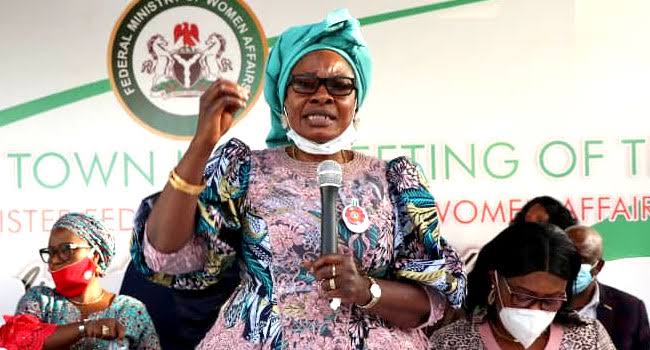The Federal Government has charged women entrepreneurs to update their knowledge and acquire all required documentations for participation in procurement processes of private and public institutions.
The Minister of Women Affairs, Ms. Paullen Tallen, while speaking at a high-level policy dialogue and exhibition, themed: “Strengthening the Capacity of Local MSMEs/Manufacturers to Produce High-quality Personal Protective Equipment (PPEs) and Healthcare-related Products,” said that the government’s sole aim is to promote the application of Gender-Responsive Procurement practices in public and private organisations.
Tallen emphasized the need for female business owners to have the required paperwork in order to participate in procurement processes on par with their male counterparts.
She said: “All the procurement in ministries must be gender sensitive. But at the same time, women must meet all the standards. We should not lower the standard because we want to favour women. Women are more than able.”
She described women as catalysts in the growth and development of any country, adding that, “in Nigeria, women account for 41 per cent of the ownership of Micro, Small and Medium Enterprises (MSMEs) represented by 23 million female entrepreneurs.
“This has placed Nigeria among other sovereign Ssates with a significantly high number of female entrepreneurs globally,” she said.
She, however, noted that women-owned businesses are mostly Micro, Small and Medium Enterprises (MSMEs), saying that “women had the potentials to expand in scope, diversify supply chains, grow the economy as well as simultaneously improve the lives of women and girls in Nigeria.”
Tallen stated that access and participation in some of these procurement opportunities have remained difficult despite governments’ efforts to support and empower women in MSMEs.
“These challenges are hinged upon the fact that procurement institutions, policies and practices are gender neutral and dominated by men. “As such, there is huge gender disparity when it comes to access procurement information by women-owned businesses.
“Even when a business owned by a woman eventually makes it to the bidding process, they have limited social and financial capital to compete effectively,” she said.
According to the minister, UN Women and other partners helped organize the event, which emphasized women-owned MSMEs in order to advance gender-responsive procurement practices in the public and private sectors.
According to Ms. Beatrice Eyong, the UN Women Country Representative in Nigeria and ECOWAS, 63 women entrepreneurs reportedly received training on producing PPEs to international standards, business mentoring, and branding to handle large skill production to mitigate the consequences of COVID-19.
Eyong emphasized that there are obstacles to a ready market for the goods produced by women entrepreneurs and urged stakeholders to integrate women in their organizations’ procurement procedures.
She said: “Address knowledge gaps among procurement officers on how to apply gender responsive procurement strategies and increase the participation of women entrepreneurs in the procurement space of both private and public organisations.”









